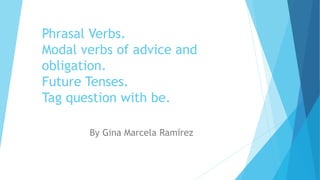
Explanation by Gina
- 1. Phrasal Verbs. Modal verbs of advice and obligation. Future Tenses. Tag question with be. By Gina Marcela Ramírez
- 2. Phrasal Verbs: A phrasal verb is a combination of a verb and preposition, a verb and an adverb, or a verb with both an adverb and a preposition. A phrasal verb has a meaning which is different from the original verb. Examples: Phrasal Verb Meaning Sentence Ask somebody out Invite on a date Brian asked Judy out to dinner and a movie. break up End a relationship My boyfriend and I broke up yesterday. call something off Cancel Jason called the wedding off because he wasn't in love. cut in Interrupt Your father cut in while I was dancing with your uncle. dress up Wear nice clothing It's a fancy restaurant so we have to dress up.
- 3. Modal Verbs of Advice English speakers use the modal verbs “should,” “ought to” and “had better” to express that they think something is a good (or a bad) idea. “Should” is the most common way to give advice. Examples: - Young children shouldn't watch violent TV shows. - It's really cold outside. You ought to wear a warm jacket. - You had better slow down. You are driving too fast! - You had better do your homework. If you do not do your homework, the teacher will give you a low mark. - Amanda should go to the doctor.
- 4. Modal Verbs of Obligation We use "must" to talk about obligations. Often, when we use "must", the authority for the obligation comes from the person who is speaking. Examples: - "You must do your homework every night." (Because I say you must!) - "I must stop smoking!" (Because I think it's a good idea to stop.) When we talk about obligation in English, we can use "must", "have to", "need to" and "can't".
- 5. We can also use "have to" to talk about rules and regulations. The authority for the obligation doesn't come from the person who is speaking. Examples: - "In England you have to pay tax.“ - Children have to go to school. We use "need to" to talk about what is necessary. - "You need to go to the hairdresser's. Your hair is very long." To say that there is an obligation not to do something, use "mustn't". "You mustn't play here – it's dangerous!“ "He mustn't eat peanuts. He's allergic to nuts." We can also use "can't": "You can't go out tonight. You've got homework."
- 6. Future Tenses: Will and Going to. The auxiliary verb will is used in making predictions or simple statements of fact about the future. Also, The auxiliary verb going to is used in talking about intentions. (An intention is a plan for the future that you have already thought about.) Finally, The present continuous tense is used in talking about arrangements. (An arrangement is is a plan for the future that you have already thought about and discussed with someone else.) Examples: - Lunch break today will be 10 minutes longer than usual. - We're going to buy a new car next month. - I'm going to work in a bank when I leave school. - I'm meeting my mother at the airport tomorrow. - Our grandparents are visiting us this Christmas.
- 7. Tag Questions Question tags are short questions at the end of statements. They are mainly used in speech when we want to: 1. confirm that something is true or not, or 2. to encourage a reply from the person we are speaking to. Examples: - Jack is from Spain, isn't he? - They aren't funny, are they? - This is Paul's pen, isn't it? - This is your car, isn't it? - They play football on Sundays, don't they?